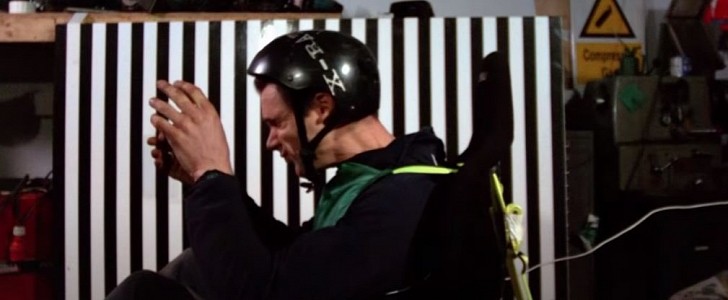Engineer, inventor, and television presenter Jem Stansfield could have been the next Jeremy Clarkson on the automotive scene had it not been for his taking part in an experiment for the BBC, which saw him serve as a human crash test dummy.
Common sense would say that no one should want to take the place of a crash test dummy, much less someone as educated as Stansfield. Yet he did it in 2014 for an episode of the BBC One science show Bang Goes the Theory. He’s now suing the network, claiming whiplash, psychological scars, dizziness and brain damage, and “very poor” chances of recovery, The Sun reports.
Stansfield is asking £3.7 million ($5.1 million) in compensation and damages, saying he’s lost work and what could have been a career on par to Jeremy Clarkson’s in the aftermath of the experiment. Speaking of which, you can see it in the video below.
The episode in question showed Stansfield riding a contraption he had devised for the experiment. The cart traveled at 60 mph (96.5 kph) and smashed into a metal lamppost, allowing him and the crew to capture the crash on high-speed cameras and then analyze the footage for a better understanding of what happens to the human body at the moment of impact. The ultimate goal was to show how children are better off in a car seat facing backward because the impact on the neck is considerably less severe.
Admirable goal aside, the experiment findings are the same (and were the same back then, too) as those from any other crash test done with dummies. Stansfield, who has a degree in aeronautics and is a leading inventor in the country, most likely underestimated the impact the two crashes would have on his body long-term.
BBC has not responded publicly to the lawsuit but is disputing the severity of the injuries in London’s High Court. The network is willing to offer him two-thirds of the money, less than what he’s asking for because of his “contributory negligence.” The payout offer hints that this whole thing was neither properly discussed nor duly covered in the contract.
In fewer and simpler words, maybe strapping humans to homemade carts and crashing them into lampposts is not a good idea for either party involved—even if it looks like it’s a good one for ratings.
Stansfield is asking £3.7 million ($5.1 million) in compensation and damages, saying he’s lost work and what could have been a career on par to Jeremy Clarkson’s in the aftermath of the experiment. Speaking of which, you can see it in the video below.
The episode in question showed Stansfield riding a contraption he had devised for the experiment. The cart traveled at 60 mph (96.5 kph) and smashed into a metal lamppost, allowing him and the crew to capture the crash on high-speed cameras and then analyze the footage for a better understanding of what happens to the human body at the moment of impact. The ultimate goal was to show how children are better off in a car seat facing backward because the impact on the neck is considerably less severe.
Admirable goal aside, the experiment findings are the same (and were the same back then, too) as those from any other crash test done with dummies. Stansfield, who has a degree in aeronautics and is a leading inventor in the country, most likely underestimated the impact the two crashes would have on his body long-term.
BBC has not responded publicly to the lawsuit but is disputing the severity of the injuries in London’s High Court. The network is willing to offer him two-thirds of the money, less than what he’s asking for because of his “contributory negligence.” The payout offer hints that this whole thing was neither properly discussed nor duly covered in the contract.
In fewer and simpler words, maybe strapping humans to homemade carts and crashing them into lampposts is not a good idea for either party involved—even if it looks like it’s a good one for ratings.







